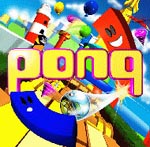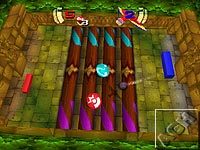Once upon a time, games were simple, easy to get into and figure out, and most
importantly, fun. Nolan Bushnell used to preach to his his employees at Atari
that a good game is easy to learn yet difficult to master. Pong, Breakout,
Asteroids and Centipede abided by those rules and each of them were smash
hits. Can the same formula apply to today's games? You bet your behind it can.
Pong for PlayStation emphatically shows that the premise of the original game is
timeless, and that Atari's modern update is a home run in a world of me-too sequels,
driving games, sports games and various Doom clones that rely on
eye-candy and other fluff to justify their existence on store shelves.
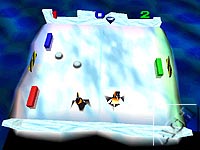
|
As the second game in what promises to be a long line of classic resurrections
(Centipede was first and Frogger doesn't count -- it's a Konami
property), Atari has really gotten creative with Pong's level designs. When
Hasbro first announced the game as being in development even I openly
wondered what could be possibly done to add variety to such a basic game as
Pong. But once you see the various environments that have been added, you'll
think to yourself, "Wow, that's a no brainer! Why didn't anyone think of this
before?" Among the multitude of different playfields include everything from
an ice level (including penguins!), a mirrored playing surface and even a very
cool foosball-type soccer field setup where each player controls two rows of
paddles each. In some levels, the game surface offers a complete change in
strategy. In the soccer level, Moles will occasionally come up and grab the
ball -- and spit it back out from a different and random spot. And every few
levels, you'll take part in a completely different setting. Some of them are
in a 3-D, pseudo first-person perspective where the object is not unlike
Breakout. And in one very wild stage, you'll even go fishing! The other new
thing you'll be confronted with is multiple balls on-screen, simultaneously.
Yep, this time it's not just one ball to contend with at any given time.
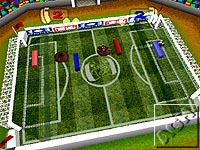
|
In addition, many secrets and bonuses have been scattered and hidden throughout
Pong, with each one offering different special powers. To access a power-up,
you need to first hit it with the ball. The spinning power-up top will then begin
to move towards your Pong. To collect the power-up, you merely need to move your
Pong into its path and touch it. They allow you to do some cool things like
whacking the ball like a baseball bat to make it go faster, catching the ball
(a-la Arkanoid), tilting the screen and having a Seal that
temporarily protects any balls from getting past you.
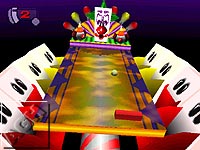
|
Undoubtedly the coolest feature of the new Pong is its multiplayer capability.
Up to four players can go head-to-head. You score points by being the last Pong
standing -- preventing the ball from going into your color-coded goal. Each
Pong defends his space (top left, top right, bottom left, bottom right) and in
this sense, it's quite reminiscent to arcade and 2600 Warlords.
The first Pong to let a goal past gets zero points, the next Pong to let a
goal in gets 1 point and so on. If you let the ball drop into your goal, it
will seal up and you're knocked out of the scoring. However, that player can
still remain involved and make a difference! You can focus your attention
more intently on obstructing your opponents and preventing your archrival of
choice from getting a good score. As a result it's a bit more involving than
Bomberman or Warlords (two of the best multiplayer games of all
time) in that everyone gets to play during the entire game.
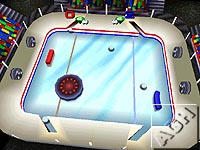
|
Pong isn't without its drawbacks, however. First of all, considering how
legendary the game is, it's somewhat unnerving to find no background
info or a small museum section contained with the game. The only mention
of the original Pong is a two-line description of the fact that it debuted
in 1972! C'mon now, how about an interview with Al Alcorn (programmer of
Pong) contained in the disc? Or at least a picture of the arcade machine
itself? As far as the game itself goes, the physics are quite different
from the original and could have used some polishing up. In the coin-op
classic, balls ricochet off the paddles in more radical angles the farther
from the center of the paddle the ball is struck. The only real way of
putting movement on your shots is to put some English on it. This will no
doubt disappoint purists who loved how the original allowed for some truly
wacky sequences where the ball bounces all over the screen. Another minor
quirk is in the camera angle/placement in some levels. For example, the
object in one stage is to drop the ball in the mouths of boxy characters
on the side of the playfield. Problem is, it's presented in first-person
view and it's especially difficult to place the ball such that it properly
falls into the opening. It's not easy to explain, but this is more of a
flaw in execution rather than a problem with control or level design. In
other, more conventional levels, the camera angle changes slightly from
time to time, and I cannot for the life of me see any benefit or change
in gameplay as a result of it.
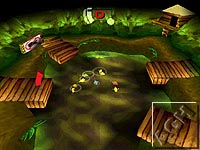
|
Speaking of control, maneuvering the paddle is not as tight or responsive as the
original, paddle-controlled coin-op. It's not unresponsive, mind you, and it
thankfully supports analog mode when using the dual shock controller. Unlike
the PC version, however, Pong does not support a mouse (which PlayStation does
have). One can't help but wish that Hasbro could have somehow packed in a simple
paddle controller with the game. Basically, you can expect to hear your foes
occassionally making excuses and cursing at the controller when he or she loses.
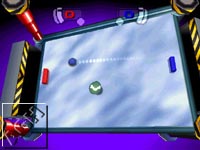
|
Overall, the new Pong is just the type of game that will remind everyone of why
they fell in love with its predecessor (and classic games in general) in the first
place. It's simple, it's addicting, and it makes for a wonderful party game. And
the clincher? Even my wife enjoyed playing it with me (good luck getting her to
pick up a controller to play Mortal Kombat or Tekken.)
It's not easy following in the footsteps of a legend, but if the original Pong was
Cy Young, PlayStation Pong is Randy Johnson -- high praise indeed.
|
Title |
Pong |
|
Publisher |
Atari |
|
System |
Sony PlayStation |
|
Graphics |
5 |
|
Sound |
6 |
|
Gameplay |
9 |
|
Overall |
9 |
|
Reviewer |
Keita Iida |
